
The War of Words
In this Adventures in Odyssey drama, a carelessly uttered word from Eugene creates havoc as it becomes the fashionable insult, resulting in a lesson about the power of words.
Home » Episodes » Focus on the Family Broadcast » Grieving, Healing, and Hoping After Miscarriage
Excerpt:
Adriel Booker: And so she went and got another midwife and said, “I need someone else. I can’t find the heartbeat. I’m going to get someone else.” And I thought, “Oh, OK, she must be having a hard day or something. She can’t find it.” And then the second one came in, and, “I can’t find it. I’m going to get a doctor.” And then I thought, “This is so weird.” I – the night before, I was awake at 2 a.m., and I’d felt the baby kick. You know, and so I thought, “There’s no way this baby is not alive. I just felt her.” And, um, but the doctor came in and, you know, brought out the ultrasound. And sure enough, the baby was gone. And I just – you know, this is very, very fresh.
End of Excerpt
John Fuller: Adriel Booker is our guest today on Focus on the Family, and your host is Focus president and author Jim Daly. I’m John Fuller.
Jim Daly: You know, John, having a baby is a time of great excitement and joy. Uh, but sometimes things go wrong. And what should be an exciting time turns into a devastating, heart-wrenching experience. For women in their childbearing years, the chances of having a miscarriage can range from about 10 to 25%. Uh, that’s extraordinarily high. I was a little shocked to think that that many pregnancies, uh, end in this way. And it gets pretty personal for you, John. Doesn’t it?
John: It does. We really didn’t know too many people who had had miscarriages until we had a miscarriage. And then out of the woodwork, this great support network of people saying, “We’ve been there.” So two miscarriages, each of at about 12 weeks, and it was pretty, pretty rough.
Jim: Yeah, and I think in that same spirit of people coming out of the woodwork, that’s why we want to do this broadcast today because a lot of women particularly, but, um, husbands, too, suffer in silence. You don’t know how to grieve this. Uh, is it OK to grieve this? What does this loss look like? Can we try for another child? All these questions that pop up that are deeply personal – and we want to at least start that conversation with you today. And we have somebody who, uh, will really help us better understand the emotions of it, the spiritual nature of it and provide some thoughtful ways forward.
John: Yeah. Adriel Booker knows, as you said, the anguish of pregnancy loss and is, uh, going to share her story and some practical help and hope, really, for the journey. She really has beautifully woven together her experience and her heart in this book called Grace Like Scarlett: Grieving with Hope After Miscarriage and Loss. And, of course, we do have that at focusonthefamily.com/broadcast. Or call us if you’d like the book or if you’d like to talk to a counselor. Uh, we’ll be talking about some tender things here. Our number is 800, the letter A and the word FAMILY.
Jim: Yeah. Adriel, welcome to Focus on the Family.
Adriel: Thank you. It’s a pleasure.
Jim: Now, I want to mention your husband, Ryan, and your three boys. You live in Sydney, one of my favorite cities.
Adriel: We do. We’re very lucky to live in a beautiful city by the sea.
Jim: It’s a gorgeous place. I really do love it. Um, Adriel, uh, this topic is so tender. It’s probably the most tender – I was even saying to Jean this morning early, just saying, “I struggle talking to guests about this topic.” And she said, “Well, maybe it’s because you haven’t experienced it.” But it’s more than that. There’s a heaviness that I always feel because it – it’s not an easy place to go. And a lot of women are going to be listening, and I’m sure their husbands, too, that are going to feel like, “I’ve experienced that,” and some who’ve never processed it. In that context, um, describe the pain and grief that’s part of this type of loss.
Adriel: You know, any grief is – is a sacred space and tender. I think when you start talking about the nature of pregnancy loss and – and issues of loss that are wrapped up in our fertility, there is an element to the grief that is – becomes deeply, deeply personal.
Jim: Yeah.
Adriel: And, um, it’s very easy for some – a woman to think, “Is there something wrong with me? Did I do something to deserve this?” You know? And…
Jim: They look inward.
Adriel: Yeah.
Jim: The guilt.
Adriel: Absolutely.
Jim: Yeah, I know.
Adriel: Well, and there’s also this sort of expectation that – it’s changing now, but there has been an expectation that you don’t share about your pregnancy until you’re sure that it’s viable, until you’re sure that it’s going to result in a live birth. And so there – that contributes to this stigma around early pregnancy. And, uh, I think people are really grappling now, especially with the rise of social media, really grappling with, how do we share? What do we share? How do we want to let people in? And, you know, I – I think as I’ve experienced loss, I’ve realized that I want to share my joy. I want to share the joy of becoming pregnant. But if I’m going to do that, I also need to be able to share the flip side, which is, if something goes wrong and I’m suffering, I need support.
Jim: Yeah.
Adriel: You know, and so – but for so long, there’s been stigma around that, and it’s been very, very private.
Jim: Yes. And I so appreciate you and your willingness to share this story, um, because it’s not one time that you experienced this. Let’s paint the picture for the listener. You and your husband, Ryan – how many children do you have, and how many are with you still?
Adriel: Mmm hmm. Well, we have seven children, so only three of those sit around our dinner table. We’ve got three sons. We had two sons, and then we experienced three consecutive miscarriages. And then we had our third son. And then, actually, just recently, uh, two months ago, we experienced another loss.
Jim: My goodness. So that – you know, some people listening, and I’m sure you’ve encountered this, where people have advice for you – right? I’m sure some people think, with that kind of consistency in miscarriage, why did you keep trying? Why did you put yourself at risk?
Adriel: Oh, that’s such a good question. And I think you’ve got to start with the fact that love is always risky.
Jim: Oh, that’s good.
Adriel: There’s no guarantees to love. Um, but we are given – you know, right from the beginning of creation, we’re given the capacity to love, but it always involves risk. You know, when we had our first miscarriage, we’d already had two sons.
Jim: Levi and Judah.
Adriel: Levi and Judah. And we…
Jim: And those were pretty normal pregnancies? I mean, they…
Adriel: Fairly straightforward. Our second one, there were – there were some complications. We were actually told midway through that he may have Down Syndrome, so we really grappled with that. That’s part of our story, too.
Jim: But in that context and for the listeners, there’s going to be, you know, young moms pregnant right now that are hearing this. Speak to that because it was a missed diagnosis.
Adriel: It – well, it wasn’t a diagnosis, per se. It was a strong possibility. There were a lot of indicators. We didn’t go forward with some of the testing because the amniocentesis can be the cause of miscarriage, and we didn’t want even the tiniest risk.
Jim: Right.
Adriel: And so we really grappled with, what would that mean to have a child with special needs? And even though we didn’t know for sure until he was born if he would have those needs or not, we – we had to come to terms with that. And that was – that was our first introduction to grief because we had to grieve the child, uh, the child’s life that we thought we were going to have.
Jim: Right.
Adriel: You know, we had to come to terms with the possibility that, um, his life may not look like we had assumed it would. You know, everyone…
Jim: And this is Judah, right?
Adriel: This is Judah, our second. And it really was a grieving process to learn how to let go of our expectations, to learn how to surrender our hopes and dreams for our children before the Lord and say, “This is your child no matter what happens.”
Jim: You know, this – this didn’t catch me when I was reading the material, but you had that – that warning from the doctor, and yet Judah was born healthy. And, oh, you must have been elated, you and Ryan, your husband. That makes the next situation even more difficult because you got through a scare, and Judah was all right. And now talk about your third pregnancy.
Adriel: Yeah. I don’t know if more difficult is the right way to put it. In some ways, I feel like that was our introduction to grief.
Jim: OK.
Adriel: It was almost – it was a preparation for us, um, in a way because we had to learn what it means to really dive into the presence of Jesus in the midst of all the uncertainty. But I will say that, you know, as we headed into that third pregnancy, uh, we had no reason to believe there would be anything wrong. We had seen the heartbeat a couple of times. We were 13 weeks along before we lost the baby, and it really didn’t occur to us – you sort of – you know intellectually that pregnancy loss is a possibility, but most people don’t assume or even worry that it will happen to them. So we were blindsided. We thought, “We have healthy children. That’s what we do.”
Jim: And what happened? This is Scarlett, right?
Adriel: Well, it was right around the change of trimesters. And, you know, many women feel pretty awful that first trimester, but things level out the second, and you start to feel better. And so that had just happened. And I thought, “Oh, wonderful. I feel great. I’m headed into the easy stretch.” But I also had this sort of nagging feeling that I just didn’t feel pregnant anymore.
Jim: And that intuition was correct.
Adriel: It was correct.
Jim: What happened?
Adriel: So I went in. I – I went in to get checked by the midwife, and she said, “You know, this does happen. Let’s keep an eye on it. Let’s wait.” And a few hours later, I thought, “I can’t wait.” And so I went back. And I said, “You need to do an ultrasound. We need to – we need to…”
Jim: “Something’s wrong.”
Adriel: “I need an answer because I really think something’s wrong.” And sure enough, there was no heartbeat.
Jim: Yeah.
Adriel: That experience of grief hit me and my husband – it hit us like a train wreck. We just were not prepared. I don’t know that you can ever be prepared, um, for something like that, for a loss of that nature, but we were so blindsided. And absolutely, the – the thing that characterized that loss the most was just an overwhelming sorrow. It was so, so sad.
Jim: Yeah. And what’s – I don’t know that the right word is unique in your story, but, you know, you had the courage, you and Ryan, to try again. That didn’t – that didn’t stop you from wanting more children. Then you were pregnant, uh, with No. 4. What happened there?
Adriel: Well, when we lost our third baby, I think we well and truly thought something is broken. You know, this is a pattern. It was scary to us because we thought, “Well, whatever was happening with the first two children, it’s not happening anymore.” We’ve now had three losses. Something is broken. We went through all the testing. Doctors could find nothing wrong with our baby, nothing wrong with us. It was a very confusing time. They encouraged us, if you want a bigger family, keep trying. But, you know, that was a very – it’s a very emotionally draining thing to have to sort of weigh up the risks of love, you know?
Jim: Right.
Adriel: As we were talking about at the beginning, love is so risky. And it’s so worth it, and it’s such a beautiful thing. But there is so much risk involved. And sometimes you feel like, can my heart take it?
Jim: Well, yeah. I was going to ask this question as delicately as I can. But does your heart become a little harder each time to protect yourself?
Adriel: Well, I think it can, but it doesn’t have to. You know…
Jim: What happened for you?
Adriel: Well – and I don’t want this to sound trite or cliché, but I have such a deep, deep belief and passion around the goodness of God that, to me, that was the one thing in my life that I didn’t understand necessarily why this was happening. I didn’t understand why God wouldn’t intervene to protect. You know, but despite all of that, I – I really do have a core belief that God is good. That is fundamental to everything about my faith.
Jim: So you trusted the Lord. That’s what that sounds like.
Adriel: Yeah.
Jim: Regardless.
Adriel: And that doesn’t mean it’s easy. But I – we trusted the Lord. We kept deciding that, you know, no matter what happens, we believe that in the end, God makes all things new.
Jim: Yes.
Adriel: In the end, he does. And that is the hope that we have.
John: And I trust that that hope is coming through our conversation today on Focus on the Family. Our guest is Adriel Booker. She has gone through a lot of loss and has captured some really great stories about the experiences and how God met her family in the midst of these things. Grace Like Scarlett: Grieving with Hope After Miscarriage and Loss – we’ve got it at focusonthefamily.com/broadcast.
Jim: Adriel, you say in your book that grief is a complex emotion. I mean, all of us agree with that, depending upon the circumstance, right? Um, you describe it as inviting us into a liminal space. What do you mean by that?
Adriel: Well, a liminal space is a space of transformation. It’s sort of an in-between space. It’s a space between who you were and who you’re becoming. And when you look at sort of the root of that word liminal, it really could be described as a threshold. So it’s not an – it’s not a place of nothing. It’s actually a place on your way to somewhere else. And so grief can totally undo a person. But grief can also remake us. And so when we find ourselves in that season of grief and loss, we are in this place of, uh, where things can feel disorienting. We can feel, uh, like we don’t know which way is up or down. But it is a place that leads somewhere else. So when I talked about a liminal space, you know, it is a place of transformation. And I think we get to work with God to even determine some of what that transformation looks like, depending on how we posture ourselves before him.
Jim: Is that – you know, I’m translating that for myself. Is it similar to where Paul’s writing about our expectation, our hope, our glory, what we look forward to, finishing the race – you know, that kind of idea that everything in this life is preparatory for our eternal life – the things that we learn, the suffering that leads to endurance which leads to character, which leads to hope? I mean, who thinks suffering leads to hope? It seems contradictory. Is that kind of what you’re expressing there?
Adriel: It is. And, you know, I mean, Jesus said, “Blessed are those who mourn, and – for they will be comforted.” And we can go, “Well, is the blessing that we mourn?” No, of course it’s not. The blessing is that in mourning you get comforted by Jesus.
Jim: Yeah.
Adriel: And so, yeah, all of these things, you know, are able to be reworked by God in his creative power, in his redemptive glory to become something that’s beautiful, even if they don’t start that way.
Jim: You know, one of the questions I often have with people that don’t have a relationship with Christ – how do they process these things? And you’ve alluded to that, the fact that God sustains you. Your relationship with Jesus sustains you. You could have trust and hope that although you don’t understand what’s happening, you trust that God does. And, uh, when you’re counseling a woman or talking to a friend about this that doesn’t know the Lord, how do you help them grieve something like this?
Adriel: Mmm hmm. Well, everyone grieves. The thing is not everyone grieves with hope. It’s hope that makes the difference. And I think there’s really two main components to being able to grieve with hope. And one is that we are able to grieve in community. We are able to have people around us that we can be honest with, that will validate our grief, that will give place for it, that will not, uh, be repelled by it but actually embrace us in our whole self and our whole humanity. And so that’s part of it. But – and then the other part of it is I believe in it. My Christian faith informs me that we have the presence of Jesus. I mean, then that is the whole story of Scripture, start to finish, is God moving into our space so that he can be with us. You know, I think it was Nahum (ph) that said, um, “Suffering” – this isn’t a direct quote, but he said, “In order to alleviate suffering, you have to move into it.”
Jim: Right.
Adriel: You know, you can’t alleviate someone’s suffering unless you’re there alongside them. And so we need that from community and we need that from Jesus. That’s what he did when he was born into our mess…
Jim: Yeah.
Adriel: …Is he came and said, “I’m not just going to whisk you out of it. I’m going to come to where you’re at. I’m going to meet you where you’re at.”
Jim: Yeah.
Adriel: And so if someone doesn’t know Jesus, you know, I think they can find some of that in community. They – we need human flesh on that witness, on that presence. You know, we need that – the ministry of presence to be offered to us.
Jim: Yeah.
Adriel: But I would also say to them, “There’s more.” And Jesus offers not only that presence, but he also offers promise.
Jim: Right.
Adriel: And that’s where the hope comes in, as that there is promise of more. There’s promise that all things will be made new. There’s promise that as new creation is formed around us and as heaven comes to earth, there will be a day when there’s no more tears.
Jim: Yes.
Adriel: And that is something so important and central to our faith.
Jim: Right. And we’re all looking forward to that…
Adriel: Absolutely.
Jim: …For those of us who have shed tears in this life, which I think is just about everybody. You have an analogy of mold, the moldy walls, in your book and what that taught you. Speak to that. Tell us what happened.
Adriel: Yeah, so – OK. So we live in a – one of these beautiful Victorian terraces in inner Sydney. So there’s a…
Jim: Is that code for an old house?
(LAUGHTER)
Adriel: Yeah. Oh, yeah. It is – I mean, it’s over a hundred years old. And it’s the row housing, you know, because it’s inner-city living. So…
Jim: Right.
Adriel: These houses don’t get a lot of sunlight. They don’t get a lot of ventilation. Um, and they are – they’re just not built well in those same ways that we do it now. So we moved into this beautiful Victorian terrace. Uh, but when we moved in, the bones were great, but this place needed a lot of (laughter) – a lot of work. And it was riddled with mold. You could smell it as soon as you walked in the door.
Jim: Right.
Adriel: And so we had to deal with this mold. We had to get rid of the carpets. We had to scrub the walls, scrape the paint, you know, vinegar everything to try and kill those mold spores. So we did the best we could to address this mold, and we repainted with mold-resistant paint. And we thought, you know, we had done a really good job. Um, and then the summer came, and it was hot. And this period hit where there were two weeks of rain every day.
Jim: Humid.
Adriel: …And very, very humid. You know, and immediately, all of that mold was back. And I think, you know, we can be so frustrated because we think, oh, we address things. And we do. We genuinely do to the depth and the level that we’re able to. And yet, they can still come up again. And, you know, with grief, grief exposes everything. It brings it all to the surface – the good, the bad, the ugly. And there are things – you know, as we are on our grief journey, processing our grief, there’s many things that come up, um, whether it be shame or a comparison or jealousy or guilt or entitlement, you know, all of these things that can come up in grief – anger toward God, you know, accusation. And we can very honestly deal with those before the Lord. But it doesn’t mean it’s a once – a one and done, you know?
Jim: Oh, right.
Adriel: And there are times where these things circle back up. And, you know, that doesn’t mean that the grief work we did before is invalid. It just means it’s time to go deeper.
Jim: Yeah. And it’s so good. To fill that story out, I mean, again, you had two boys. Then you had three miscarriages. You had another boy.
Adriel: Mmm hmm.
Jim: And how is he?
Adriel: He’s adorable.
Jim: How old is he now?
Adriel: He’s almost 3.
Jim: Oh, man
Adriel: Yeah.
Jim: And then yet a fourth miscarriage.
Adriel: Yeah.
Jim: So you and Ryan, fourth time – I mean, a lot of women listening are going, “Why do you continue to try?” How do you answer that question?
Adriel: You know, we just have always had this, uh, deep, deep desire to have a houseful of children, and we thought this fourth, you know, this last baby would be the fourth one in our home. And we thought, “This is it. We’re finished. We’re getting older. We’re closing this chapter.” And we had had Micah. We had a healthy baby after those three miscarriages, so we really thought we had turned a corner. Um, it took us a while to get pregnant with this last child, and we had almost given up. And then when we got pregnant, we thought, “This is it. This is how we finish our childbearing years. This is the end – you know, our beautiful happy ending to these hard years.” And, um, we were pregnant with a little girl. Um, I was about 4 1/2 months pregnant. We thought we had turned a corner. And I went to a routine, um, midwife exam, and she said, “I can’t find a heartbeat.” I had just – I had felt the baby kick already. I – we knew it was a girl. We had seen her on the screen more than once. When she said that – and this might sound crazy, but I really didn’t – it did not occur to me that we would lose another baby. And so I just – I wasn’t even anxious. I thought, “Oh, she must not know what she’s doing.”
Jim: Yeah.
Adriel: I really did. And so she went and got another midwife and said, “I need someone else. I can’t find the heartbeat. I’m going to get someone else.” And I thought, “Oh, OK, she must be having a hard day or something. She can’t find it.” And then the second one came in, and, “I can’t find it. I’m going to get a doctor.” And then I thought, “This is so weird.” I – the night before, I was awake at 2 a.m., and I’d felt the baby kick. You know, and so I thought, “There’s no way this baby is not alive. I just felt her.” And, um, but the doctor came in and, you know, brought out the ultrasound. And sure enough, the baby was gone. And I just – you know, this is very, very fresh. And I am still in the middle of deep sadness.
Jim: Yeah.
Adriel: …Deep grief. This is very fresh grief. I’m right in the middle of this. And just because I’ve gone through it before, just because I’ve written a book, um, that doesn’t mean that it’s not incredibly painful.
Jim: Well, and I so admire that. That – again, I think – and it may be a little bit of the male-female thing. I think we compartmentalize as men. So I – I am curious as to how Ryan is doing, your husband, with that. But I admire the freshness of your grief, if I could say it that way, that it hasn’t become routine and cordoned off somewhere. I think that’s what we, as men, do. We experience it once, experience it twice, three times. OK, we’re done. We’re calloused. Um, we can’t feel it anymore. But I think it’s wonderful that you’re with it and still feeling that.
Adriel: Well, I – I think we have to intentionally disarm our knee-jerk reaction, which is to try and overcome the pain or get around it or ignore it. Um, but as we do that, those self-protecting coping mechanisms, we don’t give the grief a chance to breathe and actually find the hope that we need and the healing that we need. So I, I mean even coming here I thought – this interview was scheduled long before this all happened. And I – I had loved ones say, you know, “Are you sure? Are you ready to talk about this?” And I thought, “I am not ready to talk about this. Of course I’m not, you know?” And yet if we can’t talk about the hope we have in the middle of when life is turning upside down, then how powerful is our hope, you know?
Jim: Well, you’ve done a wonderful job expressing your heart. I want to make sure we ask this question for those of us around a couple who is experiencing miscarriage or who has experienced it. What are the things that we should do and say? And what are the things we should not do or say?
Adriel: Mmm hmm. You know, I like – I like to describe this as, losing a baby is like giving birth and losing a loved one all at once. People can wrap their mind around that a little bit. So what are the things you would do for a family who’s just had a baby? You’d bring them flowers. You’d bring them a casserole. You’d say, “Can I watch the children? Are you sleeping? Are you drinking water?”
Jim: Right.
Adriel: You know, “How are you doing? Can I do a load of laundry?” Someone who has lost a loved one – you do very similar things. And so, you know, miscarriage – and you’ve got to remember that when someone has a miscarriage, their whole body is involved, depending on how far along they are – you know? – I mean, even to the point where their breasts might be leaking milk. But their body is – their hormones are leveling. They’re bleeding. There’s those physical reminders of the loss. And so they’re grappling with all of the changes of – of body and emotion and hormones that a new mom is with the grief of the death and the loss. And so the practical things that you can do – anything practical that you can do to help free up some of those daily decisions and daily things so that a couple can have the head space to actually do the harder work of tending to their soul – so it’s – it is showing up with the practical things – bringing flowers, bringing a meal, bringing their favorite coffee.
Jim: Watching the kids.
Adriel: Watching the kids. I think people often don’t know what to say. I – I remember a good friend after our first loss, about a month later, she said, “I’m so sorry I didn’t say anything. I didn’t know what to say.” And, you know, I forgave her, and I understood that grief makes us clumsy. And I get that. I’ve been on both sides of grief, um, and I forgave her. But I – but that was deeply wounding, you know, when your grief is not acknowledged. So even if you don’t know what to say, you can say that to a friend.
Jim: “I see you.”
Adriel: “I don’t know what to say. But I am heartbroken with you.”
Jim: Yeah. Boy, that is so good. Adriel, thank you for your testimony – you and Ryan – and for the resources, the book you’ve written, Grace Like Scarlett – um, a wonderful healing resource for women and their husbands who have gone through loss of pregnancy. And I so appreciate your courage. I really do. I see it.
Jim: Let me turn to the listener. We don’t know where you’re at, but we’re here for you. That’s what Focus is all about. And we do have great, caring Christian counselors who can enter into this process with you and help you to grieve in a way that brings about wholeness. And it’s – it’s a journey. It’s not going to be a one-hour phone call that’s going to complete this. But it’s a step in the right direction. And I’d encourage you to call us. Uh, let us get this book into your hands. It’s the kind balm or medicine that I think that hurting soul needs. And if you’re in that place, don’t hesitate. Get in touch with us.
John: Our number is 8 – yeah. Our number is 800-A-FAMILY – 800-232-6459. And, uh, our website is focusonthefamily.com/broadcast. And when you donate today—make a gift of any amount either monthly or one-time gift —we’ll send you a copy of Adriel’s book Grace Like Scarlett as our way of saying thank you for supporting the work of Focus on the Family.
Jim: Adriel, it’s been so good to have you on the program. Thank you.
Adriel: Oh, thank you for having me. It’s an honor to be invited into such a tender conversation.
John: Join us next time. Pastor Kevin Thomson offers some solid insights on marriage…
Teaser:
Kevin Thompson: I don’t think happiness is the ultimate goal of a marriage, but I do think it is the natural byproduct that comes when a couple is committed to each other and finds joy in the Lord.
End of Teaser

Adriel Booker serves in global missions as a speaker, writer, advocate, and mentor. She leads The Love A Mama Collective, a movement of women empowering women through safe birth initiatives in the developing world, and is the curator of Our Scarlett Stories, a community of parents supporting one another after loss. Adriel, her husband, and their three boys reside in Sydney, Australia, where they are cultivating an inner city YWAM community. Through her blog, www.adrielbooker.com, Adriel explores topics related to everyday spirituality, missions, family, motherhood, and global women’s issues.
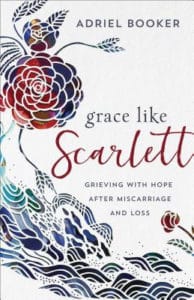
Receive Adriel Booker's book Grace Like Scarlett for your donation of any amount!
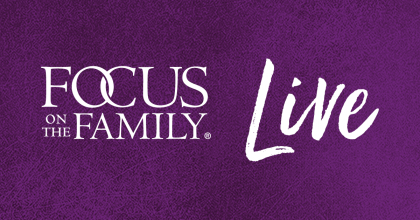
Join Jim Daly and John Fuller November 11th-15th for an exciting five-city tour featuring live broadcast tapings. Special guests include Joni Eareckson Tada, Steve Arterburn, Emily Colson, Scott Klusendorf, and Al and Lisa Robertson, along with live music from some of your favorite Christian artists!

Visit our online store and purchase a CD of today's program for yourself or to share with a friend.
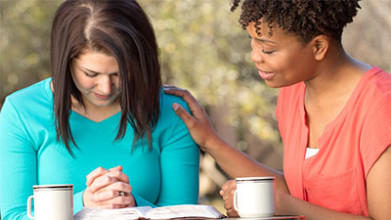
Focus on the Family offers a one-time complimentary consultation from a Christian perspective.
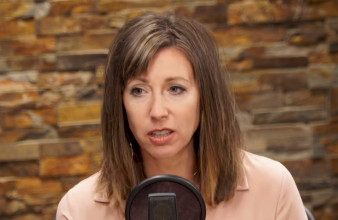
Adriel Booker describes how she walked her sons through her pregnancy loss, helping them grieve appropriately for their ages and inviting them into her own sorrow.

Ron and Genie's third pregnancy was something of a surprise, and they chose to recognize it as a blessing. But then the concerns started piling up, including markers for Down syndrome and significant heart defects.

The grief of a pregnancy loss can challenge the deepest sense of who you are, your connection with others, with life and with God. My daughter and I have discovered that processing our pain in writing helps ease the hurt.

Counselor and author Pam Vredevelt discusses the grief she and her husband experienced after losing two children, and she offers encouragement and advice for managing hurt, letting go of the past, and trusting God through tragedy.
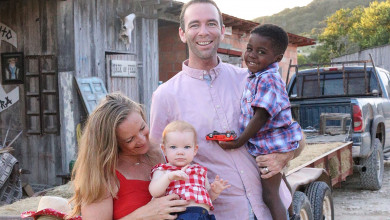
When my husband and I learned that our unborn baby would not survive outside the womb, we were devastated. Kevin and I held on to each other for dear life. We wept as one, we prayed as one and we clung to God's Word as one.

Lindsey Dennis shares her painful story of losing two children back to back, just hours after they were born, and describes the hard impact this had on her young marriage. She also shares the profound hope and comfort that she and her husband have found through their relationship with Christ.

Whether a baby survives for just weeks or for several months in the womb, there’s a profound loss of the hopes and dreams that parents carry in their hearts from the moment they learn they’re pregnant.
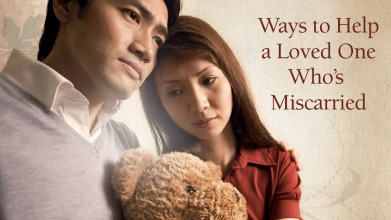
Here are nine practical ideas for how to help when someone you love has experienced a miscarriage.

Moms who miscarry, or carry a baby with a fatal diagnosis to term, speak of how the grief and trauma can be compounded by the reactions of other people.

In this Adventures in Odyssey drama, a carelessly uttered word from Eugene creates havoc as it becomes the fashionable insult, resulting in a lesson about the power of words.

This discussion offers a preview of Volume #16 “Cultures in Conflict” from the That The World May Know video series, available below.

Debra Fileta will help couples better understand the four seasons of healthy relationships, what to expect during each one, and how to carefully navigate them for a stronger marriage. (Part 1 of 2)

Larnelle Harris shares stories about how God redeemed the dysfunctional past of his parents, the many African-American teachers who sacrificed their time and energy to give young men like himself a better future, and how his faithfulness to godly principles gave him greater opportunities and career success than anything else.

Amy Carroll shares how her perfectionism led to her being discontent in her marriage for over a decade, how she learned to find value in who Christ is, not in what she does, and practical ways everyone can accept the messiness of marriage and of life.

Psychologist Dr. Kelly Flanagan discusses the origins of shame, the search for self-worth in all the wrong places, and the importance of extending grace to ourselves. He also explains how parents can help their kids find their own sense of self-worth, belonging and purpose.